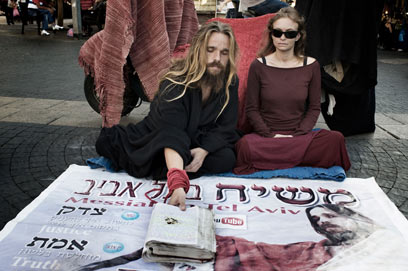
Secular Tel Aviv's very own 'messiah'
Russian-born immigrant, 31, says 'started to see God' after snake bit him in Bethlehem
Sitting cross-legged on the ground in a gritty part of town by a bustling open-air market, he exudes the air of a Biblical character, down to his long hair, beard and sandals.
"One year and two months ago I was an ordinary person and then a snake bit me in Bethlehem. And then I started to see God," he told AFP, describing how he died and was "resurrected" as the messiah.
Calling himself only "The Messiah of Tel Aviv", this 31-year-old Russian-born immigrant has become a fixture in a neighborhood more accustomed to beggars and bohemians before he announced he was a prophet, bringing dark warnings of the approaching apocalypse.
His story is unusual in Tel Aviv, but observers say the "Messiah of Tel Aviv" fits a pattern all too familiar in the Holy City, which gives its name to a rare condition called Jerusalem Syndrome.
That condition largely affects tourists who come to Israel and the Palestinian territories, where holy sites of Christianity, Judaism and Islam intersect, and suddenly find themselves overwhelmed by it all, believing themselves to be characters from the Bible.
"They come to Jerusalem, usually to see holy places. They are so overwhelmed with feelings and expectations that, in some cases, they develop some so-called manic, ecstatic, psychotic condition," said Dr Grigory Katz, a psychiatrist in Jerusalem's Kfar Shaul mental facility, and an expert on the syndrome.

Sitting cross-legged on the ground (Photo: AFP)
The syndrome is rare, but when it strikes, it usually affects Protestant pilgrims from small-town America or Scandinavia raised in pious families whose trip to the Holy Land may be their first ever abroad, he said.
Many become convinced that they are Jesus Christ, the Virgin Mary or some other character from the Bible. Usually symptoms don't last long.
"Some minor tranquillizers" brought one such patient back to "normalcy" within days, Katz said.
Back in Tel Aviv, the "messiah" is trying to turn on its head the adage that "Tel Aviv plays when Jerusalem prays."
But he has not been warmly welcomed.
"They hate me, bite me, spit on me, try to kill me," he says of passers-by, whose jibes and jabs he endures on a daily basis.
"This is the kind of thing you have to be ready for if you are messiah."
Several months ago, he was briefly propelled to national celebrity after a YouTube clip showed him being beaten up by a burly man in a black t-shirt with the Star of David emblazoned on the back.
But the attack, and the subsequent attention, seems only to have emboldened him. "I wasn't hurt because God protected me," he said. "I don't care if they are going to beat me once again."
'If this guy is the Messiah, we're screwed'
Tel Aviv's "chosen one" claims variously to be Jesus or Moses and his philosophy seems to borrow heavily from texts associated with the Jewish mystical discipline of Kabbalah, which incorporates elements of gnosticism.
His mission, he says, is to teach people to give more, take less and let go of their ego -- all before the apocalypse comes in 2012.
But in Israel, where many hold fast to religious texts that predict that a true savior will one day come to earth to redeem humanity, claims about being the messiah are not a joking matter.
"One of the foundations of the Jewish religion is the belief in the arrival of the messiah," said Rabbi Menahem Brod, a spokesman for the Chabad, a Hassidic Jewish movement which also has its own distinct ideas about the messiah.
"The messiah is no joke or a funny story, and he is not some kind of a weirdo. The messiah is supposed to be a very serious and great person," he said.
Christians teach that Jesus is the messiah, a belief rejected by Judaism.
Out on the streets, another Chabadnik is slightly more blunt that Brod.
"If this guy is the Messiah, we're screwed," he says while handing out flyers promoting the teachings of the movement's late leader, Menachem Mendel Schneerson, whom many believe will eventually come back as the true messiah.
Although the Messiah of Tel Aviv has not yet attracted the masses, he does have his fans.
Sitting next to him is a thin blond in dark glasses. She is his third "wife" in less than a year, he says.
The first disappeared after she was hustled away from the market in a car by her parents. She has since started a Facebook page claiming the "messiah" abused his female followers.
The second, a Moldovan, who was deported for overstaying her visa, appears to still be a believer.
"The time will come, and it is already near, when it will be too late for you to believe that he is the true Christ, our savior," she warned in an email.
- Follow Ynetnews on Facebook










